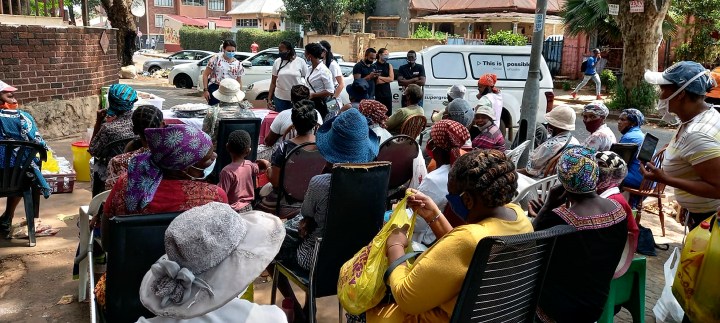MAVERICK CITIZEN
Breaking the law / The right to food: The plight of the hungry in Jo’burg’s inner city

In Johannesburg’s inner city, many risk being arrested and having their goods confiscated every day, just to put food on the table for their families.
Desperation to feed their families no matter the cost has pushed many Johannesburg residents to dangerous or illegal jobs.
A street vendor in Doornfontein, Claudia Matsi (31) said she has been operating without a permit since March 2020, selling avocados, peanuts, sweets and masks. It is her only hope to feed and school her three children in Inhambane, Mozambique. She was a domestic worker earning R3,000 before she lost her job during the lockdown. As a vendor Matsi makes R100 per day, R150 on a good day. Every month, she has to save at least R800 for rent and R500 to send home for her children.
“I don’t mind doing any kind of job just for my children to have something to eat daily. Even now as I’m operating illegally the Metro Police can come and take my stock that I will never recover, so sometimes I have to run away when I see them approaching,” Matsi said.
“Going to bed hungry is not an issue for me. Water is enough should my monthly income not cater for my food needs.”
According to Johannesburg Metro Police Department communications officer Wayne Minnaar, street vendors should have valid permits from the city councils they operate in, and comply with the following rules to avoid arrest and having their stock confiscated:
- They should not block pavements;
- They may not trade next to an ATM;
- They may not trade next to a government building;
- They must trade next to or in front of a park;
- They must not trade in an entrance;
- They must trade in front of a place of worship; and
- They must trade in a restricted area.
To retrieve confiscated goods street vendors pay R3,200 for non-perishable goods, R1,600 for perishable goods and a R120 storage fee, said Minnaar.
Along End Street is a group of sex workers. Many of them are there because they have lost other jobs and need to put food on the table.
Among them is a 34-year-old woman, who asked not to be named and who has been a sex worker for six months.
She said all she needs is a decent job. “Hunger is so extreme; often people think we are playing here or have any other choice or means of getting food. I mean, we do what we have to do – what other people say or think won’t feed me.”
Her daily meal is a R40 plate of iskopo and phuthu (cow’s head and pap), which she shares with a friend. She says her boyfriend tries to meet her food needs but it’s never enough for her and her family in Lesotho. “Sometimes I feel like a burden to him so I hustle on the side without him knowing.
“Sleeping with different men each day to make a R1,000 for food per month for my family is not easy.”
She describes a living nightmare: “Some men who come here have good or bad hygiene, but because I am in desperate need of the money I sleep with them.”
A 21-year-old homeless woman, who identified herself as “Slender”, lives on donations and pickpocketing, and sleeps at Braampark in Braamfontein. Slender said her mother abandoned her at birth and she did not know her father or any other family. She grew up in an orphanage and was kicked out when she turned 18. Slender has been living on the street for close to three years and does not remember having a decent meal during this time. “The least I can get is a quick bite of leftovers from dustbins. I survive somehow, by God’s grace.”
Samkelo Booi, a 55-year-old father of four and resident of flats opposite the Carlton Centre, says hunger has hit him and his family hard. He said the R6,000 he earns from his security job is not enough to keep them afloat every month since a basic food basket now costs more than R4,000.
“My monthly expenditure is way above what I earn. My family needs to eat, be clothed, as well as rent and pay for electricity. I also have to travel to work daily and my children are still in school. We eat the bare minimum so we cover all costs. Bread-and-butter sandwiches sustain us throughout the day, then a hot meal consisting of pap or rice served with either tomato and onion gravy, potatoes, cabbage and/or tinned fish every night.”
In April 2020, the Global Network Against Food Crises and the Food Security Information Network confirmed the food crises in southern Africa. The statistics of those who go to bed hungry remains a concern and the Covid-19 epidemic has pushed vulnerable communities even further towards the brink of survival.

A mother receives a meal package from one of the woman-owned and operated soup kitchens in Yeoville. (Photo: Rise against hunger Africa NGO)
Rise Against Hunger Africa (RAH Africa) is among many non-profit organisations helping to reduce hunger in Jo’burg’s inner city.
RAH Africa CEO Brian Nell said that before Covid-19 South Africa had more than 12 million people who were food insecure, but this is estimated to have doubled at the height of lockdown. He says they have come across many Johannesburg residents who have lost their jobs in the past 10 months. Many were restaurant and domestic employees and a large proportion are women.
“In an attempt to help reduce hunger we are providing meal packs to disaster relief organisations and community initiatives predominantly owned and run by women,” he said.
“These organisations distribute the meals to more than 500 families, old-age homes and children in need of food. The areas include Yeoville, Bertrams and Braamfontein (all of these organisations are run by women). Since the start of 2021 RAH Africa has distributed more than 36,000 meals to these organisations and demand for meals is still extremely high… people will do anything just to eat.”
Zama Ndlovu, national manager: fundraising and marketing at Mould Empower Serve, said that over the past few years they have seen the number of homeless women in the inner city grow, owing to a number of factors.
“Many women end up working on the streets, usually for a pimp, just to have shelter and to send money home. Others end up doing drugs to numb the pain and this can lead to them selling the drugs to feed their own addictions and to make a bit of money,” she said.
“Once a woman has come into contact with [Mould Empower Serve], either through our shelter, outreach activities or social work initiatives, we journey with them to make their lives better through offering them accommodation and food at our shelters. We also get them into our social work programme to support them emotionally and then get them into our Grow Job Rehabilitation programme, Sewing and Knitting Project or Gardening Project, where they start learning to work and stand on their feet again.”
To donate to the work of Mould Empower Serve in the inner cities, visit its website DM/MC
















 Become an Insider
Become an Insider
Comments - Please login in order to comment.